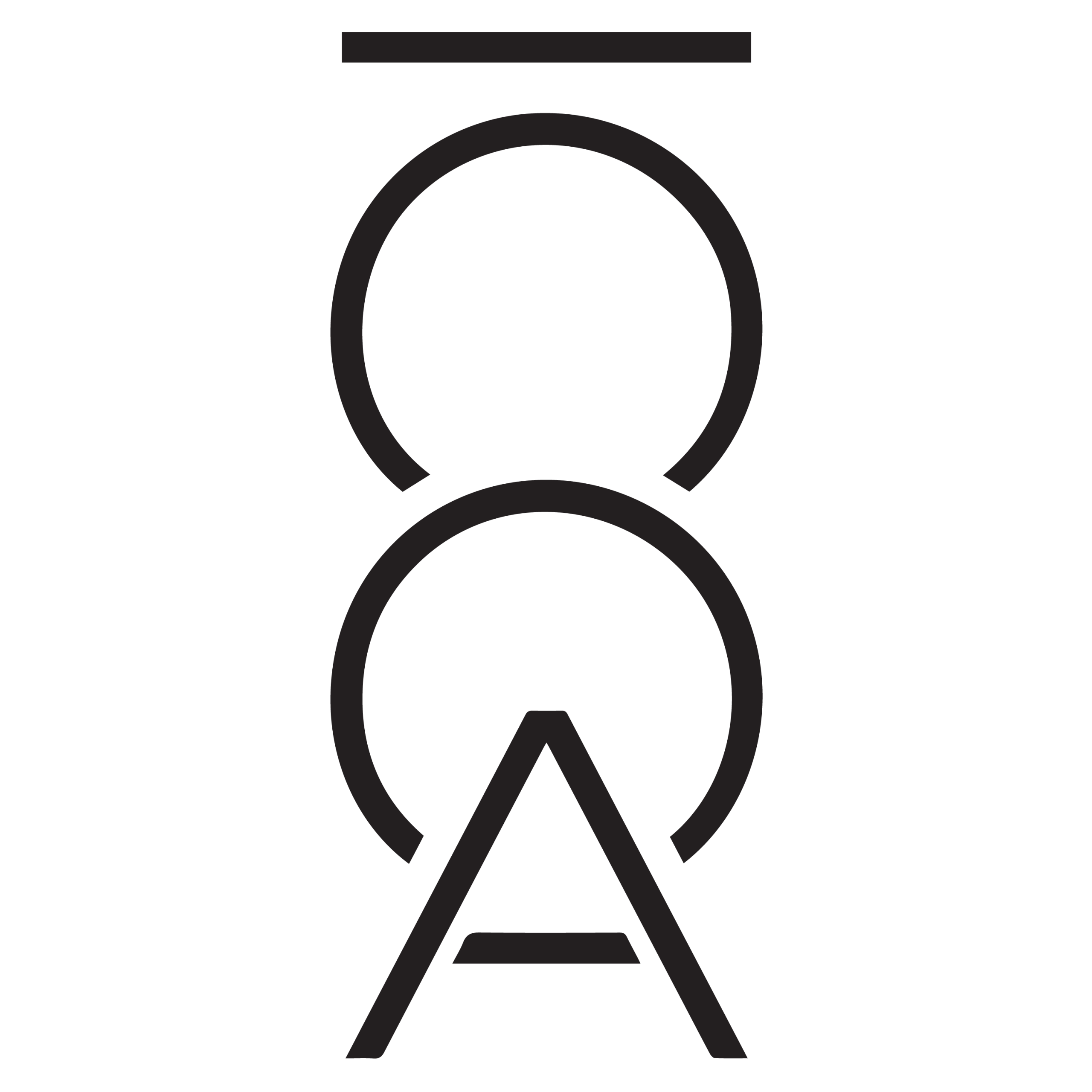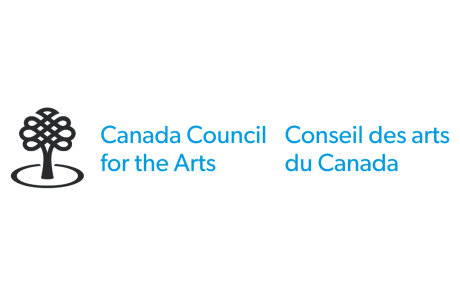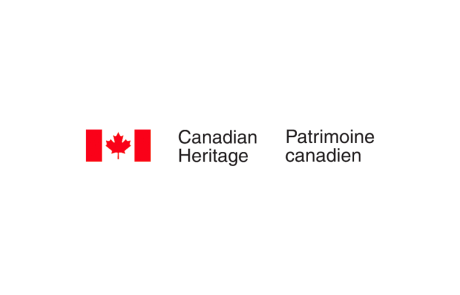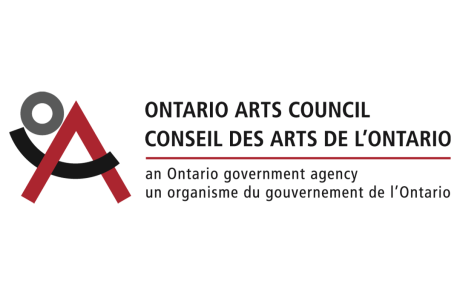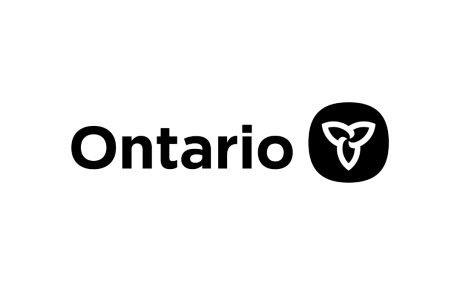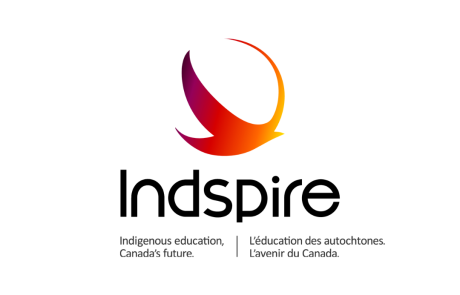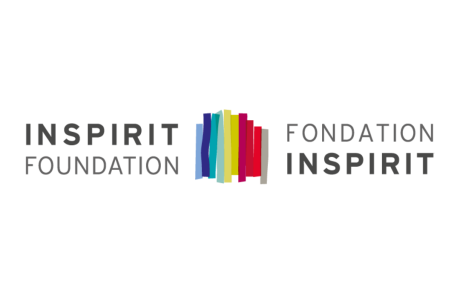Let Wanda Speak
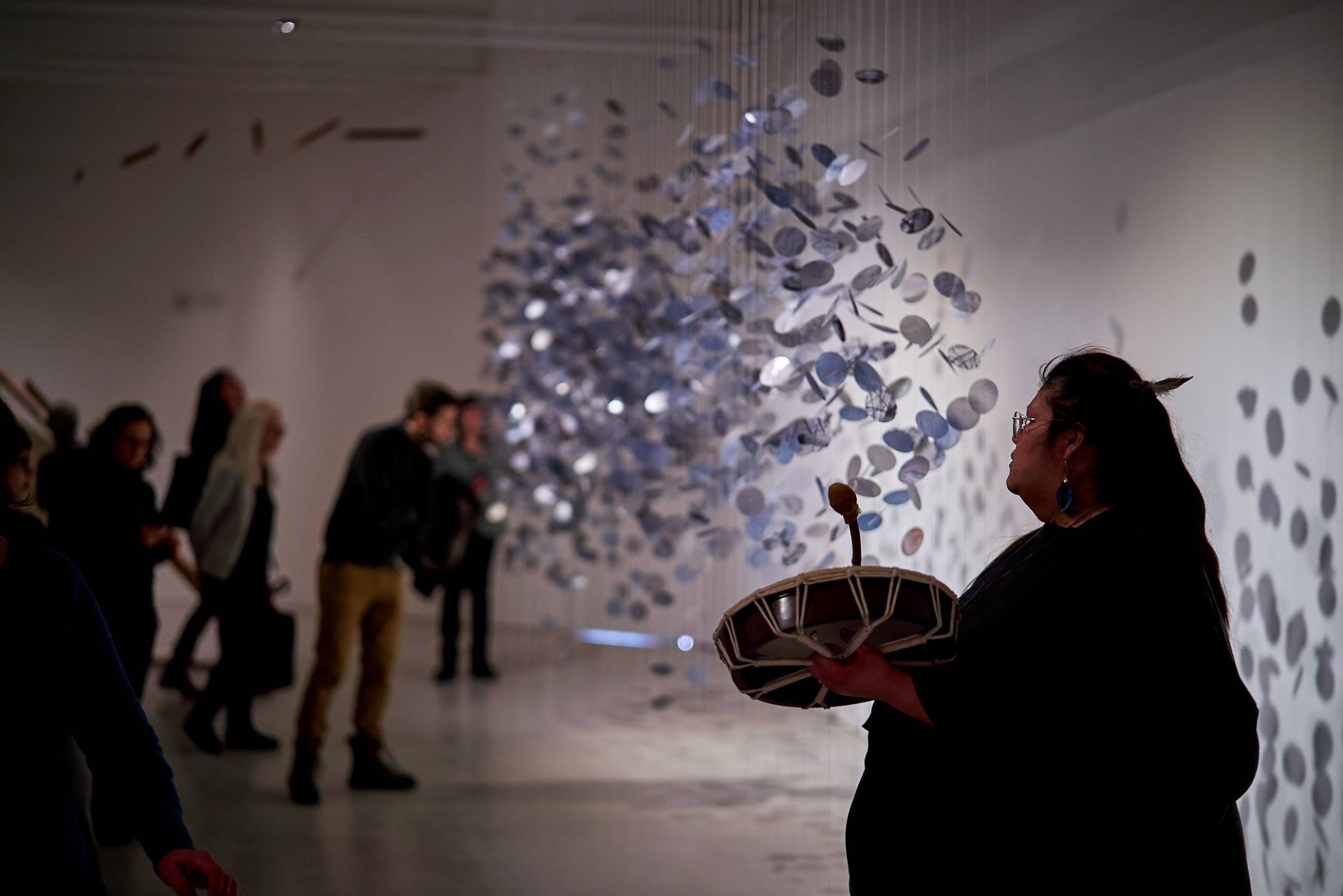
Let Wanda Speak
June 4, 2024
Dear Stephen Jost and AGO Board of Trustees,
After receiving your response to our initial letter requesting that Wanda Nanibush be permitted to speak about her leaving the AGO, a group of Indigenous-led organizations have continued to meet. We have been discussing our concerns about the AGO and the departure now of both Wanda Nanibush and Taqralik Partridge. We also have concerns for Indigenous staff still working within your institution. We have focused our conversations on the support that we can
give our community as we witness institutions like the AGO taking steps back from the decades of work many communities have done in arts institutions. It is complex, difficult work to Indigenize these spaces and make them places where we share in the celebration of art.
Reading your response it became clear to us that you did not understand that our letter was simultaneously about Wanda and also about whether Indigenous arts communities will continue to work with the AGO. These are connected for us. When an Indigenous curator – a member of our community – is silenced in their workplace this affects our community as a whole. It shows us that we need to question: what is happening within that institution? Is it a place where we
should be spending energies to share our labour and cultural knowledge?
You mentioned that the AGO is still on a path to reconciliation and will be working with an Indigenous advisory. The group of people we are meeting with – and those who have signed onto the letter to demand Wanda’s release from an NDA – represent the Indigenous visual and media art communities and beyond. We are the people creating art, running cultural organizations, activating protocols and fostering community. Knowing that there are hundreds of people in our communities who are doing this work collectively and that they have signed this letter, we ask: Who is part of the Indigenous advisory that you are calling on? How can they represent the needs of those working in Indigenous arts?
You invited us to contact you for further engagement, but specifically said that you would not be commenting further on the subject of Wanda’s departure. Although we hope that the AGO will continue working towards reconciliations/decolonization/Indigenization, we now tell you frankly – this is not the way. If we are to be in conversation with the AGO, we expect that this will be a relationship that has balance. This balance cannot be achieved in an unequal power structure where the AGO defines what we can and cannot talk about. We are living in 2024.
We are deeply disappointed in your response. We have been generous. We have shared knowledge and goodwill; we outlined what the AGO could do, also in good faith, to demonstrate to the Indigenous arts community that you want to move forward in relationality with us. You showed us that you are unwilling to understand the ways we work together to support each other.
As a collective we have decided that we will put future resources and energy into our own community. For now, we will not work to share our knowledge to benefit the AGO. We plan to hold a series of meetings to welcome the larger Indigenous arts communities, both living in Toronto and across the territory known as Canada. We will be discussing community concerns and various ways we can collectively move forward. At some appropriate time, we will be inviting you – as the AGO – to participate.
Sincerely,
Eli Hirtle, Director of Programs, Indigenous Curatorial Collective/Collectif des commissaires autochtones
Liz Barron, Director of Operations, Indigenous Curatorial Collective/Collectif des commissaires autochtones
France Trépanier, Director, Primary Colours/Couleurs primaires
Chris Creighton-Kelly, Director, Primary Colours/Couleurs primaires
Jennifer Smith, National Director, National Indigenous Media Arts Coalition
Debbie Keeper, Operations Director, Urban Shaman Contemporary Aboriginal Art
Justin Bear Larivee, Artistic Director, Urban Shaman Contemporary Aboriginal Art
Becca Taylor, Director, Ociciwan Contemporary Art Centre
Halie Finney, Core member, Ociciwan Contemporary Art Centre
Cheyenne Rain LeGrande, Core member, Ociciwan Contemporary Art Centre
Alberta Rose W. / Ingniq, Core member, Ociciwan Contemporary Art Centre
Dan Cardinal McCartney, Core member, Ociciwan Contemporary Art Centre
Tiffany Shaw, Core member, Ociciwan Contemporary Art Centre
Please direct enquiries or responses to Eli Hirtle, e.hirtle@icca.art or Jennifer Smith, director@nationalimac.org
6 juin 2024
Stephen Jost et le conseil d’administration de l’AGO,
Depuis la réception de votre réponse à notre première lettre pour demander de laisser Wanda Nanibush s’exprimer sur son départ de l’AGO, un groupe d’organismes autochtones a poursuivi ses rencontres. Nous avons discuté de nos inquiétudes à propos de l’AGO et du départ de Wanda Nanibush ainsi que de celui de Taqralik Partridge. Nos préoccupations portent aussi sur le personnel autochtone encore en poste au sein de votre établissement. Nos conversations ont axé sur le soutien à apporter à notre communauté, alors que nous assistons à des reculs de la part de certaines institutions, comme l’AGO, après des décennies de travail de la part de nombreuses communautés dans le domaine artistique. Autochtoniser ces lieux et créer des espaces où nous pouvons participer à célébrer l’art constitue certes un travail complexe et difficile.
À la lecture de votre réponse, un constat s’impose : vous n’avez pas compris que notre lettre portait à la fois sur Wanda et sur la possibilité pour les communautés autochtones de continuer à travailler avec l’AGO. Pour nous, ces deux problèmes vont de pair. Lorsqu’une commissaire autochtone – une membre de notre communauté – se voit réduite au silence au travail, cela touche l’ensemble de notre communauté. Cela nous amène à nous poser la question suivante :
que se passe-t-il au sein de cet établissement? Est-ce réellement un lieu où nous devrions consacrer de l’énergie à partager notre travail et notre savoir culturel?
Vous avez affirmé que l’AGO poursuit sa démarche de réconciliation en collaborant avec un conseil autochtone. Le groupe de personnes avec qui nous nous réunissons – et celles qui ont signé la lettre pour réclamer la levée de l’entente de confidentialité de Wanda – représente les communautés autochtones en arts visuels et médiatiques. Nous sommes les personnes qui se consacrent à la création artistique, à la gestion d’organismes culturels, à la mise en œuvre de
protocoles et à l’essor des liens dans la communauté. Ces centaines de personnes de nos communautés ont signé cette lettre et ce sont elles qui accomplissent ce travail collectivement. Nous posons donc la question suivante : qui fait partie du conseil autochtone auquel vous faites appel? En quoi ce conseil représente-t-il les besoins des personnes engagées dans le milieu artistique autochtone?
Dans votre invitation à communiquer avec vous pour poursuivre le dialogue, vous avez précisé ne pas vouloir commenter davantage le départ de Wanda. Nous espérons que l’AGO continuera à œuvrer en faveur de la réconciliation, de la décolonisation et de l’autochtonisation, mais sachez sans détour que vous n’êtes pas sur la bonne voie. Si nous dialoguons avec l’AGO, nous nous attendons à une relation d’égalité. Nous ne pouvons pas atteindre un équilibre dans une telle relation de pouvoir où l’AGO définit les sujets dont nous pouvons et ne pouvons pas discuter. Nous sommes en 2024.
Votre réponse nous déçoit profondément. Nous avons fait preuve de générosité. Nous avons partagé notre savoir et notre bonne volonté; nous avons décrit, en toute bonne foi, comment l’AGO pouvait rétablir sa relation avec la communauté artistique autochtone. Vous avez refusé de comprendre nos manières de travailler ensemble pour nous soutenir mutuellement.
En tant que collectif, nous avons décidé de consacrer nos ressources et notre énergie futures à notre propre communauté. Pour l’instant, nous ne travaillerons plus à partager notre savoir au profit de l’AGO. Nous comptons organiser une assemblée communautaire publique à Toronto en juin 2024 pour accueillir l’ensemble de la communauté artistique autochtone, qu’elle réside dans cette ville ou à travers le territoire appelé le Canada. Nous discuterons de nos préoccupations et des façons d’aller de l’avant collectivement. Nous inviterons l’AGO à assister à l’événement.
Sincèrement,
Eli Hirtle, directeur des programmes, Indigenous Curatorial Collective/Collectif des commissaires autochtones
Liz Barron, directrice des opérations, Indigenous Curatorial Collective/Collectif des commissaires autochtones
France Trépanier, directrice, Primary Colours/Couleurs primaires
Chris Creighton-Kelly, directeur, Primary Colours/Couleurs primaires
Jennifer Smith, directrice nationale, National Indigenous Media Arts Coalition
Debbie Keeper, directrice des opérations, Urban Shaman Contemporary Aboriginal Art
Justin Bear Larivee, directeur artistique, Urban Shaman Contemporary Aboriginal Art
Becca Taylor, directrice, Ociciwan Contemporary Art Centre
Halie Finney, membre principale, Ociciwan Contemporary Art Centre
Cheyenne Rain LeGrande, membre principale, Ociciwan Contemporary Art Centre
Alberta Rose W. / Ingniq, membre principale, Ociciwan Contemporary Art Centre
Dan Cardinal McCartney, membre principal, Ociciwan Contemporary Art Centre
Tiffany Shaw, membre principale, Ociciwan Contemporary Art Centre
Merci de communiquer vos demandes de renseignements et vos réponses à Eli Hirtle à l’adresse courriel e.hirtle@icca.art ou à Jennifer Smith à l’adresse courriel director@nationalimac.org.
The ICCA has received a response to the January 17 letter asking the Art Gallery of Ontario (AGO) to let former Curator of Indigenous and Canadian Art, Wanda Nanibush, speak. For transparency and accountability to our membership, our community, and the hundreds who signed the letter, it is now posted on our website at icca.art. Original PDF version can be viewed here.
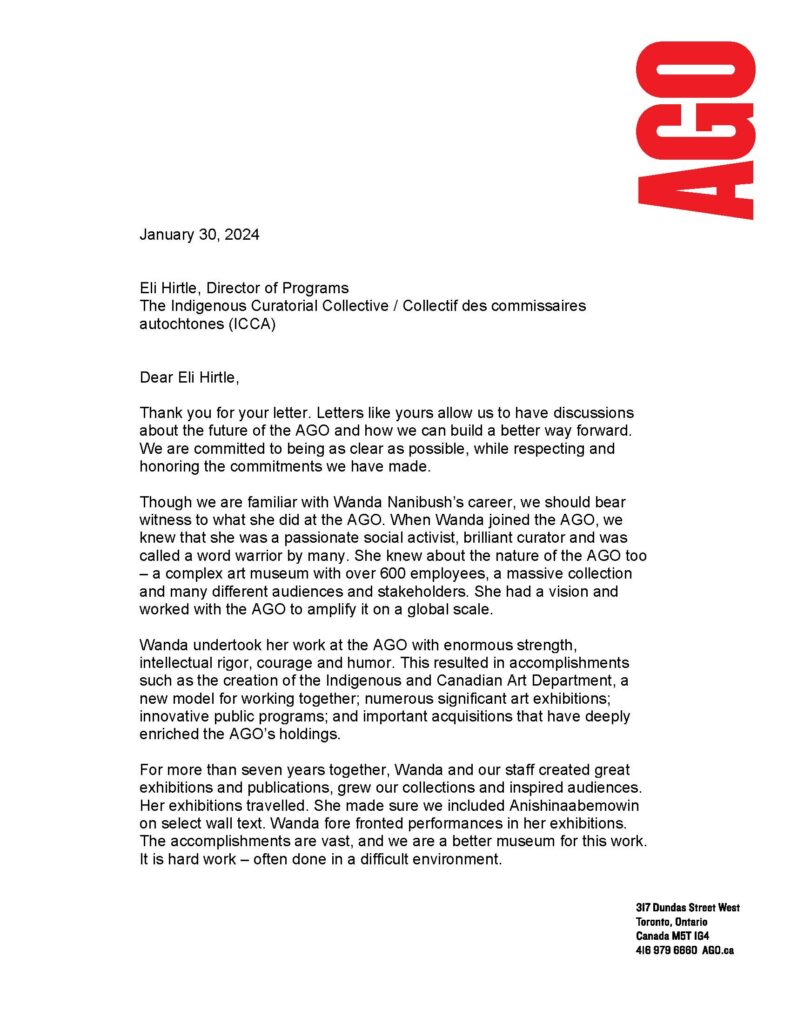
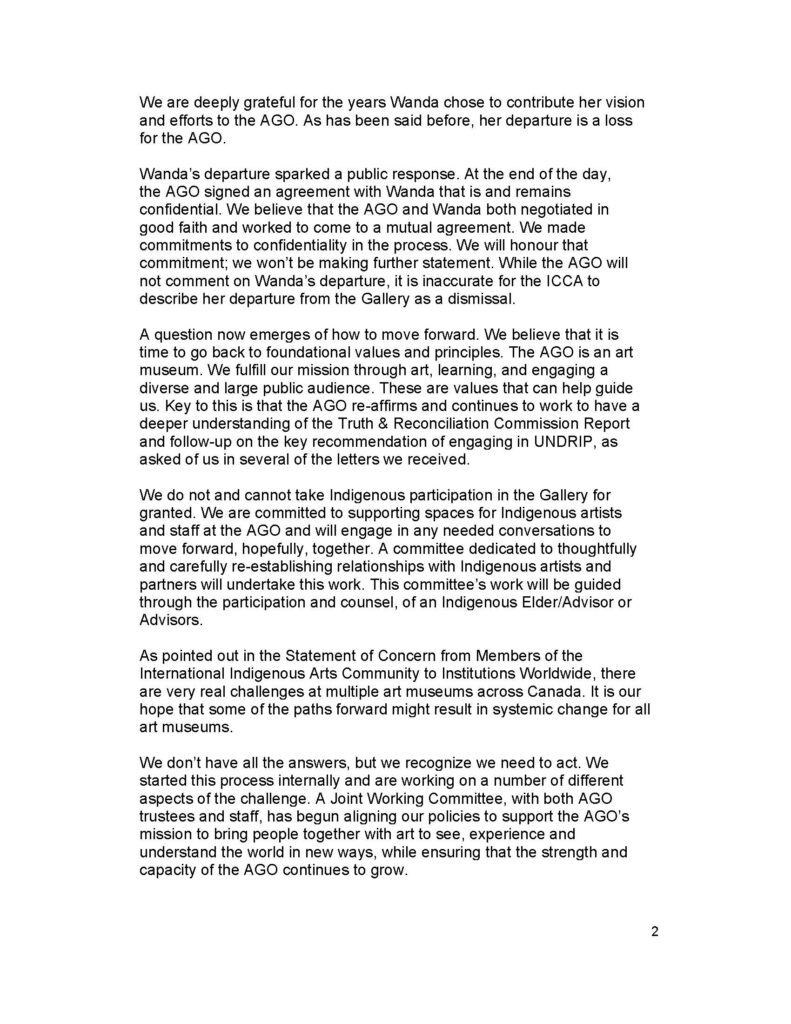
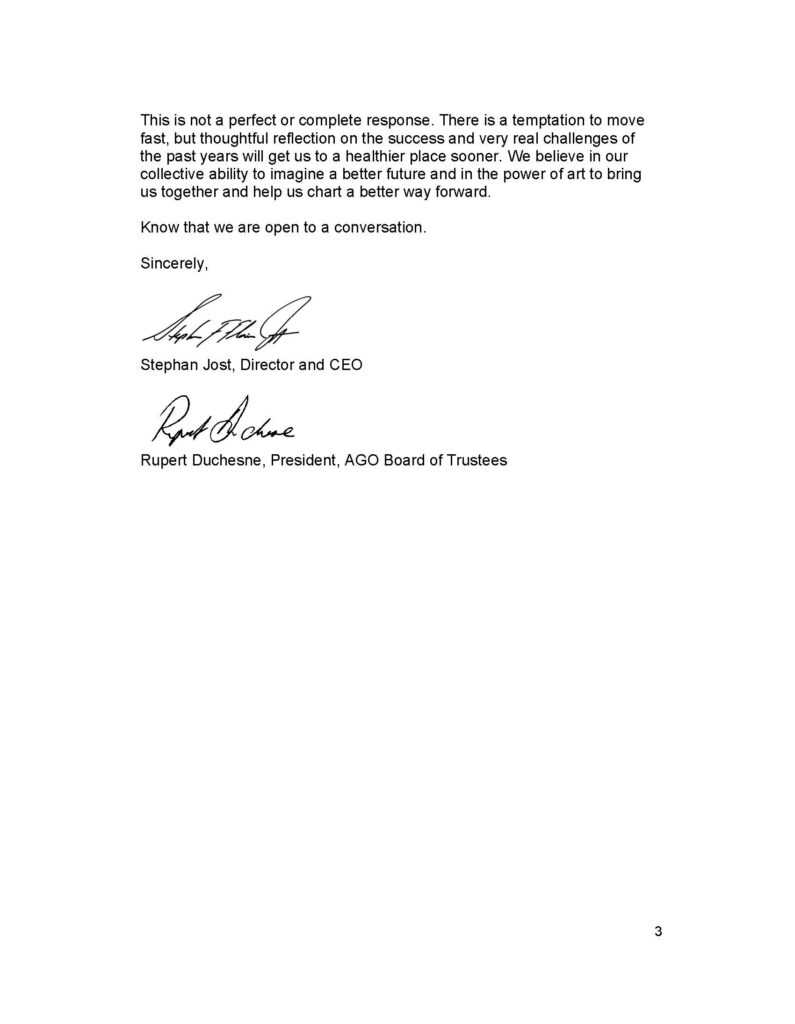
To our institutional and individual membership
Since Wanda Nanibush’s sudden departure from the Art Gallery of Ontario in November, there has been an abundance of discussion surrounding the circumstances of the situation. At the ICCA, we are particularly concerned about and advocate for creative and narrative sovereignty on behalf of Indigenous curators, artists, and writers. The fact that Nanibush is unable to speak to the particulars of what took place is especially troubling to us.
After silently removing Nanibush from their website, AGO Director and CEO responded to the outcry from our communities by releasing an Open Letter, which did nothing to alleviate our concerns, and further obfuscated the issues at hand. We see it as vital that Wanda Nanibush be able to speak freely about the circumstances regarding her departure from the AGO. We have been in conversation with colleagues at other Indigenous Arts Organizations across the country, and together we have written a letter to the AGO Board of Trustees titled “Let Wanda Speak”, demanding that “the AGO release Ms. Nanibush from any legal obligations preventing her from speaking publicly about her tenure and dismissal, about how she sees what happened and why.”
We join the thousands of artists and cultural workers who have already voiced their concerns in other open letters, and encourage anyone who would like to support this effort to sign on to the “Let Wanda Speak” letter, embedded below in English and French, by filling out this Google form.
Sincerely,
Eli Hirtle, Director of Programs
The Indigenous Curatorial Collective / Collectif des commissaires autochtones (ICCA)
Please direct enquiries or responses to Eli Hirtle, e.hirtle@icca.art
For more information, please see the following resources and press coverage:
“Thousands Urge Toronto Museum to Address Indigenous Curator’s Exit”, Hyperallergic, Nov. 28, 2023
Dear Art Gallery of Ontario Board of Trustees,
We are writing today to express our grave concern regarding the dismissal of Wanda Nanibush from her position of Curator of Indigenous and Canadian Art at the Art Gallery of Ontario, and regarding the ways in which her departure has been sorely mishandled. The repercussions of your action are being felt throughout this country by Indigenous organizations; by Indigenous people connected to arts and cultural communities; and by other institutions invested in allyship and decolonization. Your decisions caused a seismic rupture within the fragile fabric of reconciliation. The lack of transparency surrounding these actions is incredibly destabilizing for all of us left in the dark, wondering what and who will be the next to fall? The institutional autocracy that you have enacted to silence and erase the presence of Ms. Nanibush – and accomplishments she made together with you, the AGO, within your walls – is chilling.
The act of including didactics in Anishinaabemowin throughout your galleries was simple, yet revolutionary. You were one of the first. To see those words, that language, made present, instilled such pride and power in us, that we would carry with us, out into the world, giving us strength long after our visits were over. The agency afforded to Ms. Nanibush in order to enact her ideas in such a space was extraordinary. It was the result of a relationship of trust.
This presented the possibility of change not only within the walls of the AGO, but beyond, national in scope. The ripple effect was felt throughout these territories, laying the ground for what we call, “decolonization”. Our stories and voices, our ways of thinking and doing, were acknowledged and honoured at home on our land, and further – they were brought to the international stage. These were done in ways that we understood: through relationship, discourse and communication. As much as Wanda Nanibush’s position was emblematic of the potential for change and good will of the institution and those who worked there, the way in which her departure has transpired from your institution, is fraught. We now see that this relationship existed in an unbalanced power structure. Relationship building that had been done for years has been severely damaged because of your actions.
One of the basic tenets of a territorial acknowledgement is to name the people of the land. To not name them is to render them invisible. This is quite literally what you have now done to Ms Nanibush. The silencing of her person, the erasure of her presence within your institution, has broken any illusion of relationship upon which allyship with Indigenous communities must be built. This is an incredible step backwards that is so damaging, not only to the Indigenous arts community, but other racialized arts communities as well. These communities include individuals, organizations and networks who have all been affected by these events. Like a rhizomatic system, we are embedded throughout these territories. As something happens to one, it happens to all. Our trust has been broken.
In his open letter dated November 30, 2023, AGO Director, Stephen Jost, apparently assumed the Indigenous arts community will be willing to work with the AGO in the future – that the harms caused are focused on Ms. Nanibush alone and that her dismissal does not greatly affect us all. However this assumption is wrong. The AGO is a public institution. We are a part of it, as Wanda brought us in. While Mr. Jost mentions a continuing commitment to Indigenous artists, storytellers and thinkers, there is no plan on how this will be enacted. We require transparency and inclusion, trust and respect, if we are to continue on this journey together. For us, the first, necessary and most obvious step is to understand what happened and why.
We request that the AGO release Ms. Nanibush from any legal obligations preventing her from speaking publicly about her tenure and dismissal, about how she sees what happened and why. It is essential that we hear her words on this matter, to prepare the ground for any relations to begin to grow again.
Let Wanda Speak.
We hope you recognize the importance of the AGO’s relationship with the Indigenous arts community and urgently take this first step in repairing the trust that has been so badly damaged by Wanda Nanibush’s dismissal.
Do you not think that we are on a journey together? We share these lands. We have shared these lands. We must work together. We are in relationship.
We respectfully ask for a response to our request by Wednesday January 31, 2024.
If we do not hear from you by this date, we will consider other options that are arising from ongoing conversations within Indigenous arts communities.
Eli Hirtle, Director of Programs, Indigenous Curatorial Collective/Collectif des commissaires autochtones
Liz Barron, Director of Operations, Indigenous Curatorial Collective/Collectif des commissaires autochtones
France Trépanier, Director, Primary Colours/Couleurs primaires
Chris Creighton-Kelly, Director, Primary Colours/Couleurs primaires
Jennifer Smith, National Director, National Indigenous Media Arts Coalition
Debbie Keeper, Operations Director, Urban Shaman Contemporary Aboriginal Art
Justin Bear Larivee, Artistic Director, Urban Shaman Contemporary Aboriginal Art
Becca Taylor, Director, Ociciwan Contemporary Art Centre
Halie Finney, Core member, Ociciwan Contemporary Art Centre
Cheyenne Rain LeGrande, Core member, Ociciwan Contemporary Art Centre
Alberta Rose W. / Ingniq, Core member, Ociciwan Contemporary Art Centre
Dan Cardinal McCartney, Core member, Ociciwan Contemporary Art Centre
Tiffany Shaw, Core member, Ociciwan Contemporary Art Centre
Please direct enquiries or responses to Eli Hirtle, e.hirtle@icca.art

